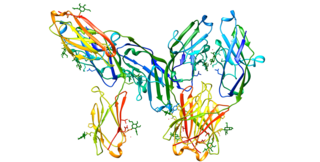The interleukin-3 receptor (CD123) is a molecule found on cells which helps transmit the signal of interleukin-3, a soluble cytokine important in the immune system.
Lintuzumab (SGN-33) is a humanized monoclonal antibody used in the treatment of cancer. The drug had been developed by Seattle Genetics as a treatment for acute myeloid leukemia (AML), a condition which results in the deaths of 9,000 people a year in the United States. Lintuzumab targets the CD33 protein, which is expressed in AML and other myeloproliferative diseases, but does not appear in abundance on normal cells.

CD33 or Siglec-3 is a transmembrane receptor expressed on cells of myeloid lineage. It is usually considered myeloid-specific, but it can also be found on some lymphoid cells.
CD70 is a protein that in humans is encoded by CD70 gene. CD70 is also known as a ligand for CD27.
Dacetuzumab is a humanized monoclonal antibody being developed for the treatment of CD40-positive cancers like non-Hodgkin's lymphoma and hematological malignancies.
Milatuzumab is an anti-CD74 humanized monoclonal antibody for the treatment of multiple myeloma non-Hodgkin's lymphoma and chronic lymphocytic leukemia.
Brentuximab vedotin, sold under the brand name Adcetris, is an antibody-drug conjugate medication used to treat relapsed or refractory Hodgkin lymphoma (HL) and systemic anaplastic large cell lymphoma (ALCL), a type of T cell non-Hodgkin lymphoma. It selectively targets tumor cells expressing the CD30 antigen, a defining marker of Hodgkin lymphoma and ALCL. The drug is being jointly marketed by Millennium Pharmaceuticals outside the US and by Seagen in the US.

Monomethyl auristatin E (MMAE) is a synthetic antineoplastic agent. Because of its toxicity, it cannot be used as a drug itself; instead, it is linked to a monoclonal antibody (MAB) which directs it to the cancer cells. In International Nonproprietary Names for MMAE-MAB-conjugates, the name vedotin refers to MMAE plus its linking structure to the antibody. It is a potent antimitotic drug derived from peptides occurring in marine shell-less mollusc Dolabella auricularia called dolastatins which show potent activity in preclinical studies, both in vitro and in vivo, against a range of lymphomas, leukemia and solid tumors. These drugs show potency of up to 200 times that of vinblastine, another antimitotic drug used for Hodgkin lymphoma as well as other types of cancer.
Glembatumumab vedotin is an antibody-drug conjugate (ADC) that targets cancer cells expressing transmembrane glycoprotein NMB (GPNMB).

Antibody–drug conjugates or ADCs are a class of biopharmaceutical drugs designed as a targeted therapy for treating cancer. Unlike chemotherapy, ADCs are intended to target and kill tumor cells while sparing healthy cells. As of 2019, some 56 pharmaceutical companies were developing ADCs.

Trastuzumab emtansine, sold under the brand name Kadcyla, is an antibody-drug conjugate consisting of the humanized monoclonal antibody trastuzumab (Herceptin) covalently linked to the cytotoxic agent DM1. Trastuzumab alone stops growth of cancer cells by binding to the HER2 receptor, whereas trastuzumab emtansine undergoes receptor-mediated internalization into cells, is catabolized in lysosomes where DM1-containing catabolites are released and subsequently bind tubulin to cause mitotic arrest and cell death. Trastuzumab binding to HER2 prevents homodimerization or heterodimerization (HER2/HER3) of the receptor, ultimately inhibiting the activation of MAPK and PI3K/AKT cellular signalling pathways. Because the monoclonal antibody targets HER2, and HER2 is only over-expressed in cancer cells, the conjugate delivers the cytotoxic agent DM1 specifically to tumor cells. The conjugate is abbreviated T-DM1.
cBR96-doxorubicin immunoconjugate is an antibody-drug conjugate or (ADC) directed to the Lewis-Y antigen designed for the treatment of cancer. The payload is the chemotherapy drug doxorubicin which is connected with a hydrazone linker to cysteine residues of the Lewis-Y specific (chimeric) monoclonal antibody BR96. Following internalization, the hydrazone is hydrolyzed within the acidic environment of target cell endosomes and lysosomes to release active cytotoxic drug.

Vadastuximab talirine is an antibody-drug conjugate (ADC) directed to CD33 (siglec-3) which is a transmembrane receptor expressed on cells of myeloid lineage. The experimental drug, being developed by Seattle Genetics, was in clinical trials for the treatment of acute myeloid leukemia (AML).
Seagen Inc. is an American biotechnology company focused on developing and commercializing innovative, empowered monoclonal antibody-based therapies for the treatment of cancer. The company, headquartered in Bothell, Washington, is the industry leader in antibody-drug conjugates or ADCs, a technology designed to harness the targeting ability of monoclonal antibodies to deliver cell-killing agents directly to cancer cells. Antibody-drug conjugates are intended to spare non-targeted cells and thus reduce many of the toxic effects of traditional chemotherapy, while potentially enhancing antitumor activity.

Monomethyl auristatin F (MMAF) is a synthetic antineoplastic agent. It is part of the approved drug belantamab mafodotin in multiple myeloma and some experimental anti-cancer antibody-drug conjugates such as vorsetuzumab mafodotin and SGN-CD19A. In International Nonproprietary Names for MMAF-antibody-conjugates, the name mafodotin refers to MMAF plus its attachment structure to the antibody.
Enfortumab vedotin, sold under the brand name Padcev, is an antibody-drug conjugate used for the treatment of urothelial cancer. It is a nectin-4-directed antibody and microtubule inhibitor conjugate. Enfortumab refers to the monoclonal antibody part, and vedotin refers to the payload drug (MMAE) and the linker.
Denintuzumab mafodotin is a humanized monoclonal antibody-drug conjugate designed for the treatment of CD19-positive acute lymphoblastic leukemia and B-cell non-Hodgkin lymphoma. It consists of an anti-CD19 mAb linked to monomethyl auristatin F (MMAF), a cytotoxic agent. This drug was developed by Seattle Genetics.
Depatuxizumab mafodotin is an antibody-drug conjugate designed for the treatment of cancer. It is composed of an EGFR IGg1 monoclonal antibody (depatuxizumab) conjugated to the tubulin inhibitor monomethyl auristatin F via a stable maleimidocaproyl link.
Immunomedics was a biotechnology company focused on the development of antibody-drug conjugates for the treatment of cancer. In 2020, the company was acquired by Gilead Sciences.
Belantamab mafodotin, sold under the brand name Blenrep, is a medication for the treatment of relapsed and refractory multiple myeloma.






